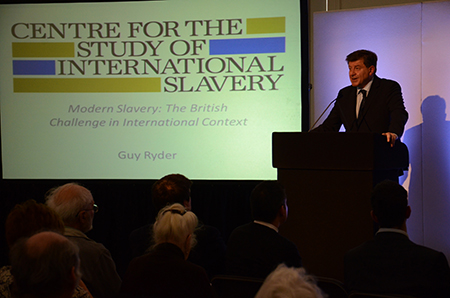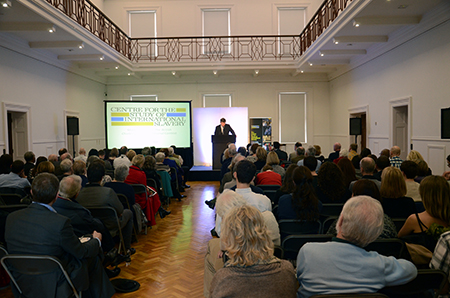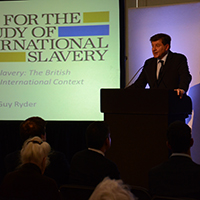 An alumnus, Guy spoke of the multi-agency approach necessary to fight slavery in a modern context
An alumnus, Guy spoke of the multi-agency approach necessary to fight slavery in a modern context
Guy Ryder, Director-General of the International Labour Organisation (ILO), condemned forced labour as “bad economics” as he delivered the inaugural Centre for the Study of International Slavery (CSIS) donor address.
Speaking at the Martin Luther King Junior Building, part of Liverpool’s International Slavery Museum, Guy placed the practice in a modern British context, drawing attention to the 21million people worldwide still held in conditions akin to slavery, forced to work or trafficked.
“Dig out the roots”
He looked back across the ILO’s history, from its inception in 1919 to major achievements ranging from combatting forced labour in the colonies in the first half of the 20th Century; to the 1957 adoption of Convention no 105, aimed at the abolition of forced labour as punishment for holding or expressing political views and, more recently, the 1998 Declaration on Fundamental Principles and Rights at Work.
Guy told those assembled that much is needed beyond criminal prosecution. To make progress in a 21st Century context, it is necessary to adopt an integrated approach and work with employers to strengthen due diligence; with governments to strengthen law, policy and enforcement; and with trade unions and civil society allies to represent and empower those at risk.
 The event was held in the Martin Luther King Junior Building, part of the International Slavery Museum on Liverpool’s Albert Dock
The event was held in the Martin Luther King Junior Building, part of the International Slavery Museum on Liverpool’s Albert Dock
All have a role to play, Guy said, because “forced labour may be big business but it is also bad economics”. He cited a 2005 ILO report estimating the illegal annual profits generated by cross-border trafficking at $32billion.
Guy cited the success of this approach, which resulted in the implementation of the Gangmasters Licensing Act and Authority in the wake of the Morecambe cockling tragedy. More recently ILO has taken it forward to combat use of forced labour in Uzbekistan’s cotton fields, forced military conscription in Eritrea and the mass exploitation of forced labour in Myanmar.
Root causes of forced labour
Dr Richard Huzzey, CSIS Co-Director said: “Guy Ryder’s lecture is a major intervention in the British debate over the imminent Modern Slavery bill. It also marks the development of CSIS’s strengths in contemporary as well historical studies of human exploitation.”
Dr Alex Balch, Lecturer in the Department of Politics and member of the Forced Labour Monitoring Group said: “Guy Ryder echoed many of the comments that have been made since the announcement of the Modern Slavery Bill when he demanded an expanded focus beyond catching criminals to make sure we tackle the root causes of forced labour and deal with the consequences for its victims.”
To watch a video of the event, please click here
A partnership between the University of Liverpool and National Museums Liverpool, the Centre for the Study of International Slavery (CSIS) supports and shares leading research about human enslavement and its legacies.
